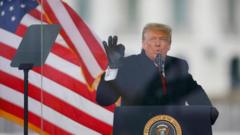Political risk analyst and economist, Dr. Theo Acheampong, has commended President John Dramani Mahama’s recent nominations to the Supreme Court, describing them as experienced legal minds whose elevation will significantly enhance the quality of the nation’s jurisprudence.
Speaking in an interview on JoyNews‘ Newsfie on Saturday, May 3, Dr. Acheampong noted that the nominees bring with them a wealth of experience, having risen through the ranks of the judiciary, including the Court of Appeal.
“If you look at the people that have been appointed to the Supreme Court, clearly they are experienced hands. They have worked through the process all the way to the Court of Appeal, and I think their appointment will enrich the quality of jurisprudence in the country,” he said.
This follows President John Mahama’s nomination of seven Justices of the Court of Appeal for elevation to the Supreme Court. Their appointments are subject to review by the Judicial Council and parliamentary approval.
The nominees include: Justice Sir Dennis Dominic Adjei, Justice Gbiel Simon Suurbaareh, Justice Senyo Dzamefe, Justice Kweku Tawiah Ackaah-Boafo, Justice Philip Bright Mensah, Justice Janapare Bartels-Kodwo and Justice Hafisata Amaleboba.
Meanwhile, the Minority Leader, Alexander Afenyo-Markin has criticised President Mahama’s nomination, describing it as a veiled attempt to implement a third-term agenda.
Speaking at a press conference organised by the New Patriotic Party (NPP) on Thursday, May 1, Mr Afenyo-Markin warned that the move poses a serious threat to the balance of power and the independence of the judiciary.
“This is not a routine judicial appointment. What we are witnessing is a strategic and deliberate effort to pack the Supreme Court with loyalists,” he stated.
“The nomination of seven Appeals Court judges immediately after suspending the Chief Justice reveals a deeper, more dangerous political ambition—a third-term agenda in disguise.”
The minority leader further accused the president of undermining democratic governance and constitutional principles.
He argued that such actions could erode public trust in the judiciary and destabilise Ghana’s democratic institutions.
DISCLAIMER: The Views, Comments, Opinions, Contributions and Statements made by Readers and Contributors on this platform do not necessarily represent the views or policy of Multimedia Group Limited.
DISCLAIMER: The Views, Comments, Opinions, Contributions and Statements made by Readers and Contributors on this platform do not necessarily represent the views or policy of Multimedia Group Limited.





